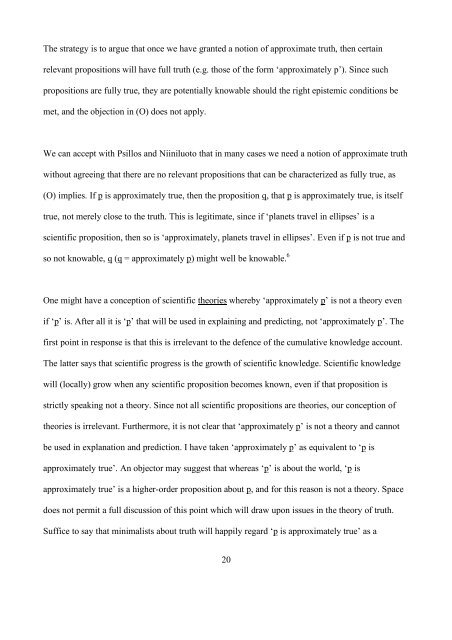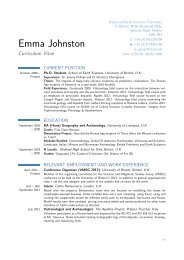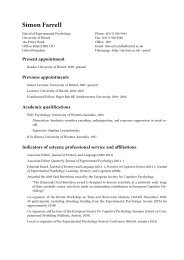What is Scientific Progress?
What is Scientific Progress?
What is Scientific Progress?
You also want an ePaper? Increase the reach of your titles
YUMPU automatically turns print PDFs into web optimized ePapers that Google loves.
The strategy <strong>is</strong> to argue that once we have granted a notion of approximate truth, then certain<br />
relevant propositions will have full truth (e.g. those of the form ‘approximately p’). Since such<br />
propositions are fully true, they are potentially knowable should the right ep<strong>is</strong>temic conditions be<br />
met, and the objection in (O) does not apply.<br />
We can accept with Psillos and Niiniluoto that in many cases we need a notion of approximate truth<br />
without agreeing that there are no relevant propositions that can be characterized as fully true, as<br />
(O) implies. If p <strong>is</strong> approximately true, then the proposition q, that p <strong>is</strong> approximately true, <strong>is</strong> itself<br />
true, not merely close to the truth. Th<strong>is</strong> <strong>is</strong> legitimate, since if ‘planets travel in ellipses’ <strong>is</strong> a<br />
scientific proposition, then so <strong>is</strong> ‘approximately, planets travel in ellipses’. Even if p <strong>is</strong> not true and<br />
so not knowable, q (q = approximately p) might well be knowable. 6<br />
One might have a conception of scientific theories whereby ‘approximately p’ <strong>is</strong> not a theory even<br />
if ‘p’ <strong>is</strong>. After all it <strong>is</strong> ‘p’ that will be used in explaining and predicting, not ‘approximately p’. The<br />
first point in response <strong>is</strong> that th<strong>is</strong> <strong>is</strong> irrelevant to the defence of the cumulative knowledge account.<br />
The latter says that scientific progress <strong>is</strong> the growth of scientific knowledge. <strong>Scientific</strong> knowledge<br />
will (locally) grow when any scientific proposition becomes known, even if that proposition <strong>is</strong><br />
strictly speaking not a theory. Since not all scientific propositions are theories, our conception of<br />
theories <strong>is</strong> irrelevant. Furthermore, it <strong>is</strong> not clear that ‘approximately p’ <strong>is</strong> not a theory and cannot<br />
be used in explanation and prediction. I have taken ‘approximately p’ as equivalent to ‘p <strong>is</strong><br />
approximately true’. An objector may suggest that whereas ‘p’ <strong>is</strong> about the world, ‘p <strong>is</strong><br />
approximately true’ <strong>is</strong> a higher-order proposition about p, and for th<strong>is</strong> reason <strong>is</strong> not a theory. Space<br />
does not permit a full d<strong>is</strong>cussion of th<strong>is</strong> point which will draw upon <strong>is</strong>sues in the theory of truth.<br />
Suffice to say that minimal<strong>is</strong>ts about truth will happily regard ‘p <strong>is</strong> approximately true’ as a<br />
20






